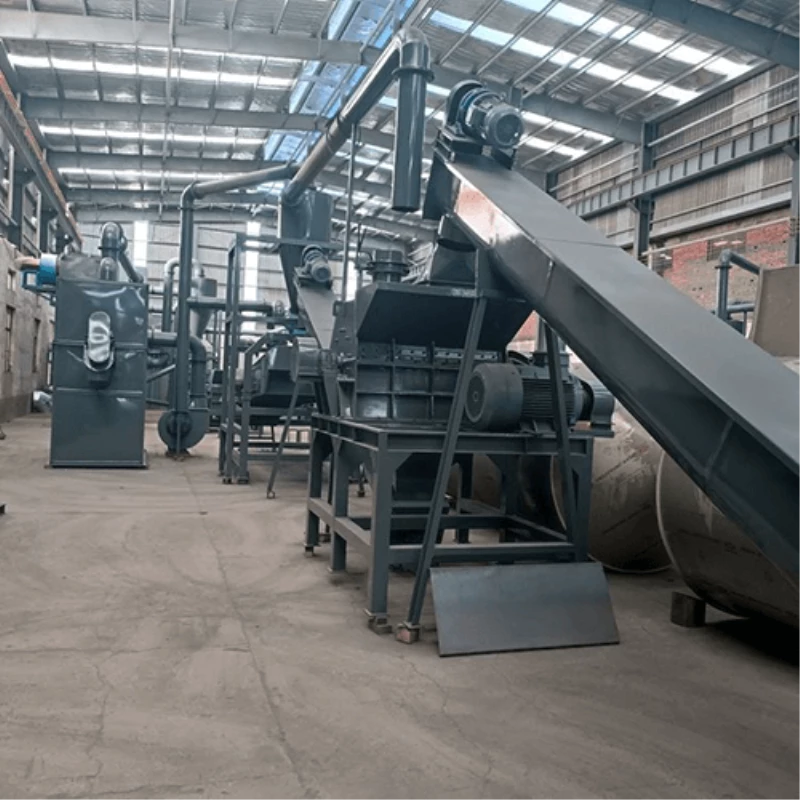Basic Introduction
Used lithium batteries are mainly composed of shell, positive electrode, negative electrode, electrolyte and diaphragm.
The cost of the four key materials, namely cathode material, anode material, diaphragm and electrolyte, accounts for more than 80% of the battery cost.
The cathode material of lithium-ion battery contains up to 45%-50% cobalt, of which the cost of cathode material also occupies about 40% of the total cost of lithium-ion battery.
Positive electrode is composed of lithium cobalt oxide powder coated on both sides of aluminum foil collector through PVDF which plays the role of bonding.
Negative electrode structure is similar to the positive electrode, composed of carbon powder bonded on both sides of the copper foil collector.
Lithium battery crushing and recycling equipment is to recycle waste lithium batteries, after discharge, using mechanical equipment for hammer crushing, wind selection, crushing, gravity airflow sorting, vibration screening and other processes, so that the active materials on the positive and negative electrodes and the copper and aluminum foils can be effectively separated, and the batteries will be processed into the materials containing valuable metals.
Scope of Treatment
Various types of soft pack lithium batteries, plastic shell lithium batteries, hard shell lithium batteries, steel shell lithium batteries, aluminum shell lithium batteries and other multi-material lithium batteries.
18650 galvanized shell lithium batteries, 32650 lithium batteries, lithium ternary batteries, lithium iron phosphate batteries, cylindrical lithium batteries, lithium batteries for end-of-life cars and other types of lithium batteries.
Introduction to The Process
1, from the conveyor material into the first level for coarse crushing, coarse crushed material through the conveyor into the second level of broken machine for secondary crushing, two broken machine crushed material into the conveyor at the same time set up a magnetic separation equipment, you can sort out the iron in the material.
2、After the material conveyor and magnetic separator remove the iron, it enters into the third broken machine for fine crushing, which crushes the material to powder, and crushes the material to about 20 mesh.
The material in powder state enters into the cyclone separator for air filtration by the negative pressure system, and falls to the airflow separator through the blower, and the airflow separator carries out two times of sorting, so that the materials with different densities are stratified, and we get the positive and negative electrode materials and the materials of copper, aluminum and nickel. And all the non-metals are brought into the pulse dust collector by negative pressure system for concentration.
3, the filtered tail gas will continue to be sent by the negative pressure system to the tail gas treatment equipment for air purification, so that it meets the emission standards and then discharged into the air.
Composition of Equipment
Including: battery discharge device, crushing device, pulverizer device, vibrating screen device, wind selection device, magnetic selection device;
The battery discharging device is used for discharging the used lithium battery;
The crushing device is used to carry out crushing treatment on the discharged used lithium battery;
The crushing device is used for crushing the used lithium battery after crushing to obtain the diaphragm and battery fragments;
Vibrating sieve device is used to screen the battery fragments;
The air-selecting device is used to carry out air-selecting treatment on the dried battery fragments, so that the powdery material in the battery fragments is detached from the diaphragm;
The vibrating sieve device is used for sieving the treated battery fragments, so that the copper and aluminum metals in the battery fragments are separated from the black powder;
The wind selection device is used to sort out the powder and lighter plastic diaphragm etc. in the crushed material with the help of wind power, and at the same time, the part of volatile electrolyte adhering to the material is pumped out with the wind.
Magnetic separation device can separate out the ferromagnetic material in the crushed material.
Role of Core Equipment
1. Shredder: Shred the lithium battery;
2. Hammer crusher: to separate the shredded materials for secondary crushing;
3. Pulverizer: crush the crushed material;
4. Analyzer: Separate the crushed materials by wind separation;
5. Collector: collect and discharge the dust through the induced draft fan;
6. Pulse purifier (air purifier): to purify the dust of the whole set of equipment;
7. Grading sieve: screen the materials sorted by the analyzer, and sort out the big metal materials;
8. Magnetic separator: separating nickel from metal;
9. Specific gravity sorting machine: to sort the fine materials through the sorting sieve and then the specific gravity sorting, to separate out the metal;
10. Blower: keep the whole system in negative pressure, collect the powder and purify the air.
Vi. Technical Parameters
|
No. |
Content of The Project |
Detection Methods |
Note |
||
|
1 |
Production Capacity Indicators |
1500kg/h |
Trial machine test |
Delivered for normal operation |
|
|
2 |
Processed Object |
Lithium battery |
Gage measurement |
|
|
|
3 |
Recovery Rate |
Positive and negative materials (black powder) |
99≥% |
Gage measurement |
Includes baghouse recycling |
|
Aluminum powder |
98≥% |
Gage measurement |
|
||
|
Copper powder |
98≥% |
Gage measurement |
|
||
|
4 |
Purity |
Positive and negative electrode material powder (black powder) |
99≥% |
Gage measurement |
Includes baghouse recycling |
|
Aluminum powder |
98≥% |
Gage measurement |
Contains a small amount of plastic powder and other materials |
||
|
Copper powder |
98≥% |
Gage measurement |
Contains a small amount of plastic powder and aluminum powder |
||
|
5 |
Diaphragm |
Content of lithium |
0.2≥% |
Gage measurement |
|
|
6 |
Workshop Dust |
Dust concentration |
Less than 20mg/m3 |
Instrumental measurement |
|
We have more categories for you. lf you can't find the products you want above,just fill in the form and tell us whatproducts you want to import from China.













